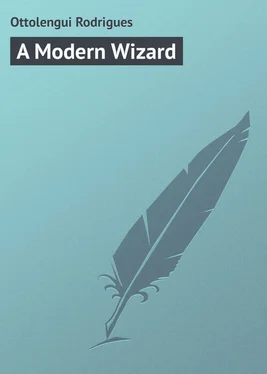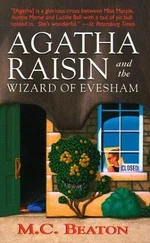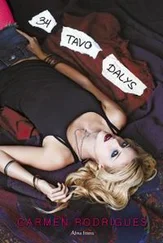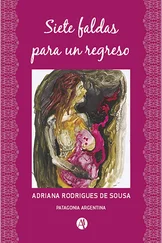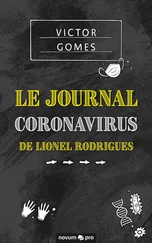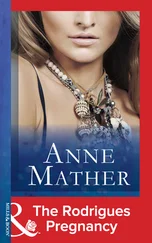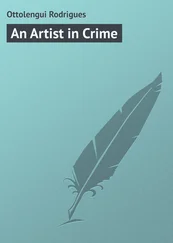Rodrigues Ottolengui - A Modern Wizard
Здесь есть возможность читать онлайн «Rodrigues Ottolengui - A Modern Wizard» — ознакомительный отрывок электронной книги совершенно бесплатно, а после прочтения отрывка купить полную версию. В некоторых случаях можно слушать аудио, скачать через торрент в формате fb2 и присутствует краткое содержание. Жанр: Классический детектив, foreign_detective, foreign_prose, на английском языке. Описание произведения, (предисловие) а так же отзывы посетителей доступны на портале библиотеки ЛибКат.
- Название:A Modern Wizard
- Автор:
- Жанр:
- Год:неизвестен
- ISBN:нет данных
- Рейтинг книги:3 / 5. Голосов: 1
-
Избранное:Добавить в избранное
- Отзывы:
-
Ваша оценка:
- 60
- 1
- 2
- 3
- 4
- 5
A Modern Wizard: краткое содержание, описание и аннотация
Предлагаем к чтению аннотацию, описание, краткое содержание или предисловие (зависит от того, что написал сам автор книги «A Modern Wizard»). Если вы не нашли необходимую информацию о книге — напишите в комментариях, мы постараемся отыскать её.
A Modern Wizard — читать онлайн ознакомительный отрывок
Ниже представлен текст книги, разбитый по страницам. Система сохранения места последней прочитанной страницы, позволяет с удобством читать онлайн бесплатно книгу «A Modern Wizard», без необходимости каждый раз заново искать на чём Вы остановились. Поставьте закладку, и сможете в любой момент перейти на страницу, на которой закончили чтение.
Интервал:
Закладка:
"From what you observed, Doctor," said he, "are you prepared to assign a cause of death?"
"I should conclude that she died of coma!" was the reply.
"Can you state whether this coma had been produced by a poisonous dose of morphine?"
"I should say that it was very probable that opium in some form had been exhibited, in a poisonous dose."
"State specifically why you have adopted that opinion!"
"I found the brain wet, the convolutions flattened; the lungs, heart, liver, and spleen, distended and engorged with dark fluid blood. The vessels of the cerebro-spinal axis were also engorged with black blood, and the capillaries of the brain, upon incision, vented the same fluid."
"And these signs are indicative of opium poisoning?"
"They are the only evidences of opium poisoning that can be discovered by an autopsy. Of course a chemical analysis, if it should show the presence of the drug, would go very far to corroborate this presumption."
"Then if the chemical analysis shows the actual presence of opium, would you say that this patient died of opium poisoning?"
"I would!"
"Doctor, it has been suggested that she died of diphtheria. What is your opinion of that?"
"I found evidences in the throat and adjacent parts, that the woman had had diphtheria, but, from the total absence of false membrane, I should say that she was well on the way to a recovery from that disease, at the time of her death."
"Then from these facts do you think that she died of opium poisoning?"
"I think it most probable, judging by what I found after death."
"It has been testified by the physician in charge of the case, that the symptoms of morphine poisoning were sufficiently marked for him to deem antidotes necessary prior to death. Would not that corroborate your own conclusions?"
"If correct, it would substantiate my opinion."
Considering the very positive and damaging nature of this evidence, it was thought that the cross-examination would be very exhaustive. To the surprise of all, Mr. Bliss asked only a few questions.
"Dr. McDougal," said he, "did you examine the kidneys?"
"I did."
"In what condition did you find them to be?"
"They were much shrunken, and smooth. Non-elastic."
"Is that a normal condition?"
"No, sir. It is a morbid condition."
"Morbid? That is diseased. Then this woman had some kidney disease? Do
I so understand you?"
"Unquestionably!"
"Can you state what disease existed?"
"I should say Bright's disease."
"Might she not have died of this?"
"No. There was evidence of the existence of Bright's disease, but not sufficient to adjudge it a cause of death."
"But you are certain that she had Bright's disease?"
"Yes, sir."
"That is all."
Professor Orton then took the stand for the prosecution. Under the questioning of Mr. Munson, he described himself to be an expert analytical chemist and toxicologist. He said that he was a lecturing professor connected with the University Medical College, and clinical chemist for two other schools, besides being president of several societies, and member or honorary member in a dozen others. Then, proceeding to a description of his work on this particular case, he explained in almost tedious detail his methods of searching for morphine in the organs taken from the body of the deceased. Some of these tests he repeated in the presence of the court, showing how, by the reaction of his testing agents upon the matter under examination, the presence or absence of morphine could be detected. Having thus paved the way towards the special evidence which he was expected to give, his examination was continued as follows:
"Now then, Professor," said Mr. Munson, "you have proven to us very clearly that you can detect the presence of morphine in the tissues. Please state whether you examined the organs of the deceased, and with what result?"
"I made a most thorough examination and I found morphine present, especially in the stomach and in the intestines."
"Did you find it in poisonous quantities?"
"The actual quantity which I found, would not have been a lethal dose, but such a dose must have been administered for me to have found as much as I did find."
"Well, from what you did find, can you state what quantity must have been administered?"
"I cannot state positively, but I should guess – "
"No! No! I object!" cried Mr. Bliss, jumping up. "You are here to give expert testimony. We do not want any guess-work!"
"Professor," said the Recorder, "can you not state what was the minimum quantity which must have been administered, judged by what you found?"
"It is difficult, your Honor. The drug acts variably upon different individuals. Then again, much would depend upon the length of time which elapsed between the administration, and the death of the individual."
"Then in this case your opinion would be a mere speculation and not competent," said the Recorder, and Mr. Bliss seated himself, satisfied that he had scored another point. But he was soon on his feet again, for Mr. Munson would not yield so easily.
"Professor," said he, "you said in reply to his Honor, that you could not answer without knowing how long before death the drug had been administered. Now with that knowledge would you be able to give us a definite answer?"
"A definite answer? Yes! But not an exact one. The drug is absorbed more rapidly in some, than in others, so that one person might take two or three times as much as another, and I would find the same residuum. But I could tell you what was the minimum dose that must have been administered."
"Well, then, supposing that the drug had been administered about three hours before death, how large must the dose have been, or what was the minimum quantity that could have been given, judging by what you found?"
"I must object to that, your Honor!" said Mr. Bliss.
"Your Honor," said Mr. Munson, "this is a hypothetical question, and perfectly competent."
"It is a hypothetical question, your Honor," replied Mr. Bliss, "but it contains a hypothesis which is not based upon the evidence in this case. There has been absolutely no testimony to show that morphine was administered to this woman about three hours before death."
"We have a witness who will testify to that later," replied Mr. Munson, and this announcement created no little sensation, for here was promised some direct evidence.
"Upon the understanding," said the Recorder, "that you will produce a witness who will testify that morphine was administered three hours before death, I will admit your question."
"We take an exception!" said Mr. Bliss, and sat down.
"Now please answer the question," said Mr. Munson, addressing the witness.
"Under the hypothesis presented I should say that the minimum dose must have been three grains."
"That is to say, she must have had three grains, or more?"
"Yes, sir; three grains or more."
"What is a medicinal dose?"
"From a thirty-second of a grain to half a grain, though the latter would be unusual."
"Unusually large you mean?"
"Yes. It would be rarely given."
"Then would you say that three grains would be a lethal dose?"
"It would most probably prove fatal. One sixth of a grain has been known to produce death."
"One sixth of a grain has proven fatal, and, from what you found, you conclude that three grains had been given to this woman?"
"Yes, provided your hypothesis as to the time of administration is correct."
"Oh, we will prove the hypothesis."
"Then I should say that three grains had been administered."
"Three grains or more?"
"Yes, three grains or more."
"You may take the witness," said the Assistant District Attorney, and
Mr. Bliss at once began his cross-examination.
Читать дальшеИнтервал:
Закладка:
Похожие книги на «A Modern Wizard»
Представляем Вашему вниманию похожие книги на «A Modern Wizard» списком для выбора. Мы отобрали схожую по названию и смыслу литературу в надежде предоставить читателям больше вариантов отыскать новые, интересные, ещё непрочитанные произведения.
Обсуждение, отзывы о книге «A Modern Wizard» и просто собственные мнения читателей. Оставьте ваши комментарии, напишите, что Вы думаете о произведении, его смысле или главных героях. Укажите что конкретно понравилось, а что нет, и почему Вы так считаете.
